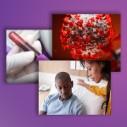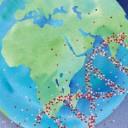-
On Being Asked Not to Tell: Hiding Illness From Loved Ones
Keeping her grandfather's cancer a secret from him felt counterintuitive to Tina Chai as a teen, but conversations with other Chinese Americans helped her understand the reasons Chinese physicians and families may practice cancer nondisclosure.
by Tina Chai
-
Cancer and COVID-19 Vaccination
Amid continued research showing the impact of COVID-19 on people with cancer, patients are asking when they should get a COVID-19 vaccine.
by Marci A. Landsmann
-
Colorectal Cancer Screenings at Home
Stool-based tests could increase access to colorectal cancer screening.
by Jen Tota McGivney
-
When Young Adults Need Care
For adolescents and young adults who have been diagnosed with cancer, caregivers can play an influential—but often overlooked—role in providing help and support.
by Carly Flumer
-
2020: This Year in Cancer News
The Cancer Today editorial staff selects some of the most impactful reporting and essays of 2020.
by Cancer Today Staff
-
Roadblocks to Care
Some cancer patients struggle to find transportation to their appointments. The coronavirus pandemic has further limited options for patients looking for rides.
by Anna Goshua
-
Physicians Underestimate Severity of Radiation Side Effects
Breast cancer patients' symptoms after radiation therapy may go underrecognized, especially if these patients are Black or younger in age.
by Marci A. Landsmann
-
Drug Dependence After Breast Surgery
A study indicates that some breast cancer patients who receive mastectomy and reconstruction may be at risk of persistent drug use following surgery.
by Marcus A. Banks
-
Cancer Centers Cope With COVID-19 Surge
Doctors at cancer centers in states with record COVID-19 hospitalization rates reflect on how lessons from early in the pandemic are helping them care for patients during the current surge.
by Ashley P. Taylor
-
Why Do African Americans Have Increased Breast Cancer Mortality?
Socioeconomic factors and racism can lead to poorer health outcomes for Black Americans. Genetics may also be a factor behind increased mortality rates.
by Marci A. Landsmann
Cancer Talk
Treatment Combination Improves Survival in EGFR-positive Lung Cancer
Adding chemotherapy to targeted therapy improves outcomes for people with advanced EGFR-positive non-small cell lung cancer.
by Sandra Gordon
Lessons From 20 Years Living With CancerMultiple myeloma survivor Jonathan Gluck reflects on uncertainty, and the scientific progress that has kept him living with cancer for more than two decades.
by Eric Fitzsimmons
The Enduring Importance of Cancer Disparities ResearchOpening session from AACR conference highlights how perseverance and adversity have informed cancer disparities research over the years.
by Eric Fitzsimmons
Most Cancer Survivors Don’t Meet Healthy Diet GoalsDespite research linking fruits and vegetables to cancer survival, many people do not change their eating habits after diagnosis.
by Darlene Dobkowski














